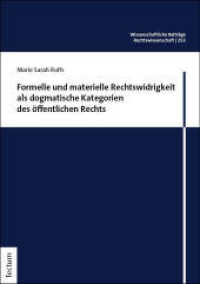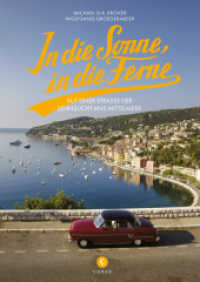- ホーム
- > 洋書
- > ドイツ書
- > Humanities, Arts & Music
- > Religion & Theology
- > christianity
Description
(Text)
Andreaes 'Christianopolis' ist die bedeutendste Utopie der evangelischen Theologie. Sie zeigt den Musterstaat des geistlichen Republikanismus, das weltliche Ziel der protestantischen politischen Theologie. In einer zweiten Reformation sollten universelle Bildung, geistliche Disziplinierung und Wohlfahrtspolitik miteinander verbunden werden. Andreaes theologisch-politische Vision wurde zum Leitbild sowohl des protestantischen Fürstenstaates als auch des englischen revolutionären Republikanismus des 17. Jahrhunderts. Das allegorisch-polemische Lehrgedicht 'Christenburg' aus dem Jahr 1626 sieht die Vision zuhöchst gefährdet und zeigt, wie sehr sich die Situation der evangelischen Seite im Dreißigjährigen Krieg verschlechtert hatte.
(Review)
(Text)
Andreae's 'Christianopolis' is the most important utopia of Protestant theology. It shows the model state of spiritual republicanism, the secular goal of Protestant political theology. Universal education, spiritual disciplining and welfare policies were to be combined in a second Reformation. Andreae's theological-political vision became a model of the Protestant princely states as well as of English revolutionary republicanism in the 17th century. The allegorical and polemical didactic poem 'Christenburg', written in 1626, sees the vision as being critically endangered and shows the extent to which the Protestants' situation had deteriorated in the Thirty Years' War.
(Review)
»This new edition of the 'Reipublicae Christianopolitanae descripto' makes available to German readers an essential legacy of Johann Valentin Andreae. [...] With each new volume of the 'Gesammelte Schriften' that appears, the portrait of this educational and social reformer, who so embodied the Protestant culture of Germany, and whose theological-political vision influenced English republicanism in the seventeenth century, becomes more distinct.« Donald R. Dickson, Seventeenth-Century News







